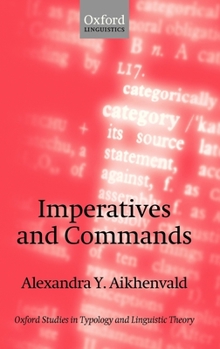Imperatives and Commands
Select Format
Select Condition 
Book Overview
This is the first cross-linguistic study of imperatives, and commands of other kinds, across the world's languages. It makes a significant and original contribution to the understanding of their morphological, syntactic, semantic, and pragmatic characteristics. The author discusses the role imperatives and commands play in human cognition and how they are deployed in different cultures, and in doing so offers fresh insights on patterns of human interaction and communcation. Alexandra Aikhenvald examines the ways of framing commands, or command strategies, in languages that do not have special imperative forms. She analyses the grammatical and semantic properties of positive and negative imperatives and shows how these correlate with categories such as tense, information source, and politeness. She looks at the relation of command pragmatics to cultural practices, assessing, for example, the basis for Margaret Mead's assumption that the harsher the people the more frequently they use imperatives. Professor Aikhenvald covers a wide range of language families, including many relatively neglected examples from North America, Amazonia, and New Guinea. The book is accompanied by illustrations of some conventional command signs. Written and presented with the author's characteristic clarity, this book will be welcomed by linguists of all theoretical persuasions. It will appeal to social and cultural anthropologists and cognitive and behavioural scientists.
Format:Hardcover
Language:English
ISBN:0199207909
ISBN13:9780199207909
Release Date:October 2010
Publisher:Oxford University Press, USA
Length:520 Pages
Weight:1.99 lbs.
Dimensions:1.1" x 6.1" x 9.2"
Customer Reviews
0 rating





